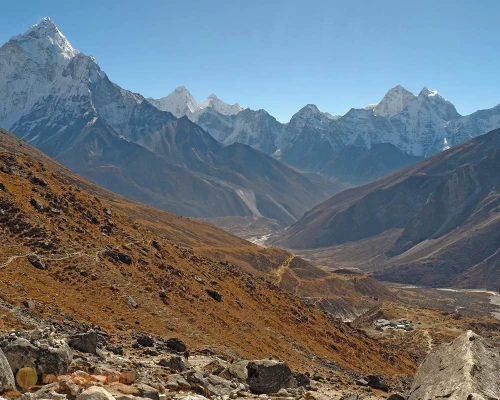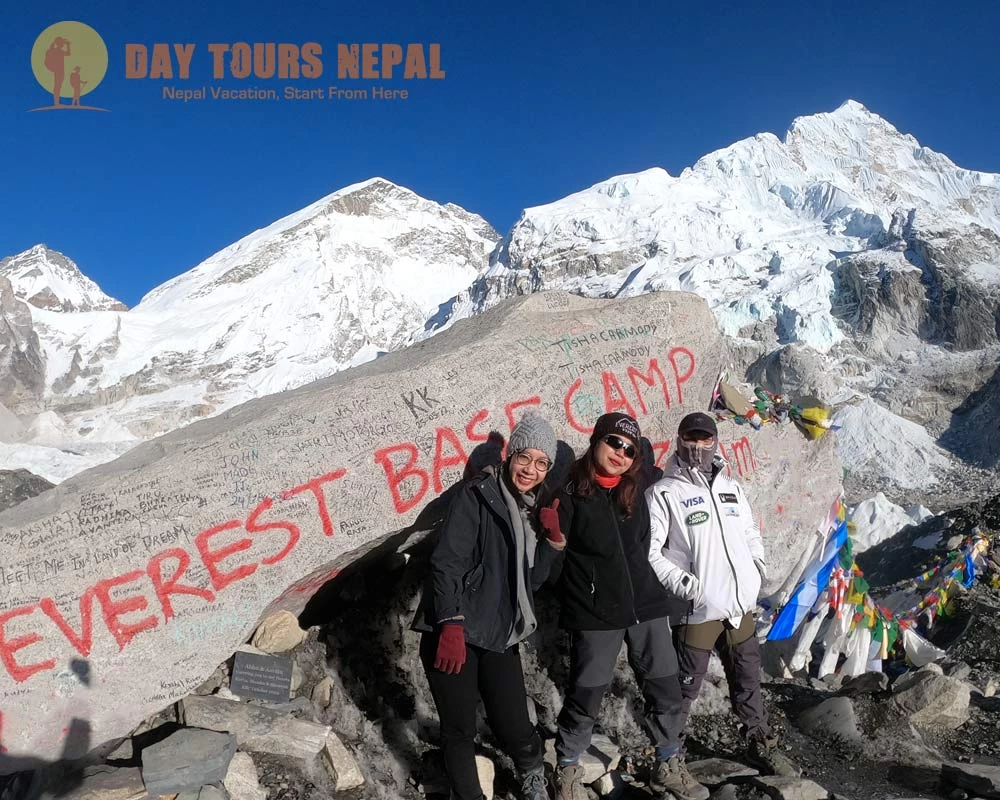Trekking to Everest Base Camp and Flying Back by Helicopter: We have the Everest Base Camp Trek with Helicopter Return available for individuals looking for an amazing experience that requires minimal time commitment. With this thrilling alternative, you can hike to Everest Base Camp and experience the sheer magnificence of the mountain while returning to Lukla via a picturesque helicopter ride after your journey. This offers a unique aerial view of the Himalayas and shortens the total trek.
Nepal Everest Base Camp Heli Trek Highlights
- Scenic flights to Lukla and helicopters back from Gorakshep
- Picturesque villages like Namche Bazaar and Tengboche
- Acclimatization days for a safe and enjoyable trek
- Hike to Everest Base Camp, the starting point for Everest expeditions
- Panoramic views of Everest, Lhotse, Ama Dablam, and other Himalayan giants
- Sunrise from Kalapatthar, a breathtaking vantage point
Trekking in the high Himalayas of Nepal is the ultimate adventure for trekkers throughout the world. We're not sure what would excite hikers more if Nepal were home to eight of the world's fourteen tallest peaks. By far the most famous and tallest of them all, standing at 29,029 feet, is Mount Everest. Being the most popular peak, it attracts a lot of visitors and admirers, and many of them are prepared to go on the Everest Base Camp expedition (EBC trip).
The Everest Base Camp (5364 m/17598 ft) is a small settlement that serves as the starting point for the Everest ascent and is located at the foot of the Khumbu Icefall. Reaching this area, which lies hundreds of meters above the Khumbu Glacier, requires either a helicopter flight or a footpath. Since EBC is literally located above a flowing glacier, there are no permanent housing buildings there; instead, guests are supposed to sleep in insulated tents.
The Traditional Everest Base Camp Trek Route Remains Valid;
This option follows the same basic schedule as our traditional Everest Base Camp expedition. You'll walk the same route while soaking in the stunning scenery, Sherpa culture, and the process of gradually becoming acclimated to the altitude. You won't have to walk back downhill from a high elevation, like Gorakshep, to Lukla, saving you time and energy.
Advantages of Trekking to Everest Base Camp and Returning by Helicopter:
Shorter Total Trip Time: This option is perfect for people who have a restricted number of vacation days because it allows you to complete the Everest Base Camp trip in a shorter amount of time.
Scenic Helicopter Tour: Take in breath-taking vistas of Everest and the surrounding peaks during a helicopter trip above the Himalayas.
Less strain on the knees: If you have pre-existing knee problems, it may be better to forego the downhill walk.
Enjoy Base Camp on Everest in Style: Experience the wonders of Everest Base Camp in a pleasant and effective manner with the Everest Base Camp Trek with Helicopter Return. For adventure seekers who are pressed for time but still want to take on this legendary Himalayan challenge, it's the ideal choice.
Now let's talk about the features of our Everest Base Camp Trek Heli Return trip packages, which include both the traditional trek and the the helicopter return.
Everest Base Camp Trek Heli Return Outline Itinerary
- Day 1: Arrival at Kathmandu (TIA) airport, escort to hotel.
- Day 2: Flight from Kathmandu to Lukla and trek to Phakding.
- Day 3: Phakding to Namche
- Day 4: Namche acclimatisation and Hiking day to Hotel Everest View
- Day 5: Namche to Tengboche
- Day 6: Tengboche to Dingboche
- Day 7: Dingboche acclimatization; explore around.
- Day 8: Dingboche to Lobuche
- Day 9: Lobuche to Gorakshep: Trek to Everest Base Camp and back to Gorakshep
- Day 10: Gorakshep to Kalapatthar: Gorakshep fly to Kathmandu by helicopter.
- Day 11: Final departure or extension of your holiday in Nepal
Nepal Everest Base Camp Trek Difficulty:
The EBC Trek is considered a moderate trek due to the high altitude. While the trails themselves aren't technical, the lack of oxygen and long distances can be challenging. Expect to feel fatigue, especially above 5,000 metres.
The Best Seasons for the EBC Trek:
Spring (March–May) and autumn (September–November) offer the best weather conditions for the EBC Trek. Clear skies and comfortable temperatures make for enjoyable trekking. Avoid the monsoon season (June–August) due to heavy rain, and flights to Lukla might be cancelled and delayed.
Can Beginners Join This Nepal EBC Trek?
While beginners can participate, a good level of physical fitness is crucial. Train your endurance beforehand to ensure a smooth experience.
Altitude sickness on the Everest Helicopter Return Trek:
Altitude sickness is a concern at high altitudes. Proper acclimatization is vital. Staying hydrated and ascending gradually helps prevent altitude sickness.
Accommodation, Food, & Drinks During the Everest Heli Trek:
The EBC region boasts the most developed trekking infrastructure in Nepal. You'll find comfortable lodges with basic amenities like hot showers. Food options cater to trekkers, with local Sherpa specialties alongside familiar dishes. Remember to bring your own water purification tablets or purchase bottled water throughout the trek.
Transportation Flights and Helicopters:
Your EBC trek package will cover all necessary land transportation. This includes airport transfers (arrival and departure) in Kathmandu, a scenic flight to Lukla, and a helicopter from GorakShep.
Everest Trekking Permits:
A Sagarmatha National Park Entry Permit and a Khumbu Pasang Lhamu Rural Municipality Entrance Permit are mandatory for the EBC Trek. The Everest Trek permits are included in this Everest Base Camp trek heli return trip package.
Trip Preparation & Fitness for the EBC Trekking Holiday
- Train your stamina for long hikes with elevation gains.
- Pack appropriate clothing and gear for varying weather conditions.
- Research altitude sickness symptoms and prevention measures.
Alternative Routes to Reach Nepal Everest Base Camp:
- EBC Gokyo Lakes Trek: Offers stunning lake views but adds extra days.
- Everest 3 Pass Trek: A longer and less crowded option.
Cost & Budget of the Everest Base Camp Helicopter Return Trek
The starting price for our 11-day Everest base camp trek package is $2100 USD. We offer fair and open pricing; upon request, you will receive a comprehensive summary of the costs. All of your land transportation costs, three meals a day for the duration of the trek (apart from in Kathmandu), domestic airfare to Lukla Airport, the helicopter ride from Gorakshep to Kathmandu, all necessary lodging during the trek, a licenced, experienced English-speaking guide, porters and assistant guides are included in our Everest base camp trekking heli return tour package.
Along with lodging, meals, gear rentals, daily salaries, and insurance coverage for the entire trekking team—including guides and porters—this Everest Base Camp Trek will also cover these costs. We will pay for your permit costs, all official taxes, a first aid package with the essential medications for the hike, sleeping bags (rated for -20 degrees Celsius), and duffel bags for each member of the party.
Internet access and device charging on the Everest Base Camp Trek in Nepal.
There are electricity facilities at every location along the route, so you won't have to worry about running out of battery. As an aside, you may receive bills from some lodges for using their internet and charging your devices; we will not cover those costs. You will have access to a cell phone network all along the trail, which sets this Himalayan trekking route in Nepal apart from most others. However, the altitude will affect the network connection strength, and certain locations may not have any network connectivity at all.
Your additional costs for the EBC Trek.
The gratuities you may choose to leave for the porters and guides, visa fees, overseas airfare, emergency services costs (very unusual), hot showers, wifi bills, device charging bills, and travel insurance costs are all considered additional expenses. Basically, there are additional costs for everything outside of the services we offer.
Essential Trekking Gear and Equipment For Everest Base Camp Heli Trek
You will need essential gear, equipment, and clothing for the Everest Base Camp Helicopter Return Trek. One porter will carry luggage for two people, so the luggage weight limit is 10 kg per trekker. You can store your extra luggage at your hotel, which is safe, or you can store it in our office.
Head
- Sun hat
- Winter hat or insulating hat
- Headlights
- Face
- Sunscreen
- UV protection Sunglasses
Hands
- Gloves depending on the season.
Body
- Hiking shirts
- Long-sleeved shirt
- Fleece jacket: 1
- Lightweight cotton pants
- T-Shirt
- Polypropylene underwear
- Down jacket
- Waterproof jacket and pants
Footwear
- Hiking Boots
- Thick wool socks and thick, light socks
- Flip-flop
Essential gear
- Daypack 20/30 Litre
- Water bottle and camel water bag: helpful
- Water purification pills
- Trekking pole
- Sleeping bag (-15 bag is best in high-altitude trekking)
Toiletries
- Medium-size drying towel
- Toothbrush
- Toothpaste
- Deodorant floss
- Wipes
Extra items
- First aid kit
- Notebook and pen
- Camera: lenses
Things to Know Before Booking the Everest Base Camp Helicopter Trek.
Every year, thousands of enthusiastic hikers follow the EBC trail on the highly sought-after Nepal Everest Base Camp journey. You may anticipate having a great time while taking in unique views of everything from verdant, rural villages to enormous peaks that make you feel insignificant. As the most popular Himalayan trekking location in Nepal, you might meet some new friends along the way. You will always cherish our 12-day Everest base camp trip with helicopter return. You won't be able to resist sharing the photos from your adventure on social media. The scenes are simply too amazing not to share. Overall, our 12-day EBC trekking package is tailored to provide the best possible experience. Our goal is to ensure that your journey goes as smoothly as possible. That's our primary objective. Anticipate a hassle-free journey to Nepal's remote Himalayas, where you will visit traditional Sherpa villages and learn about their customs, among many other experiences.



.webp)
.webp)
.webp)
.webp)




